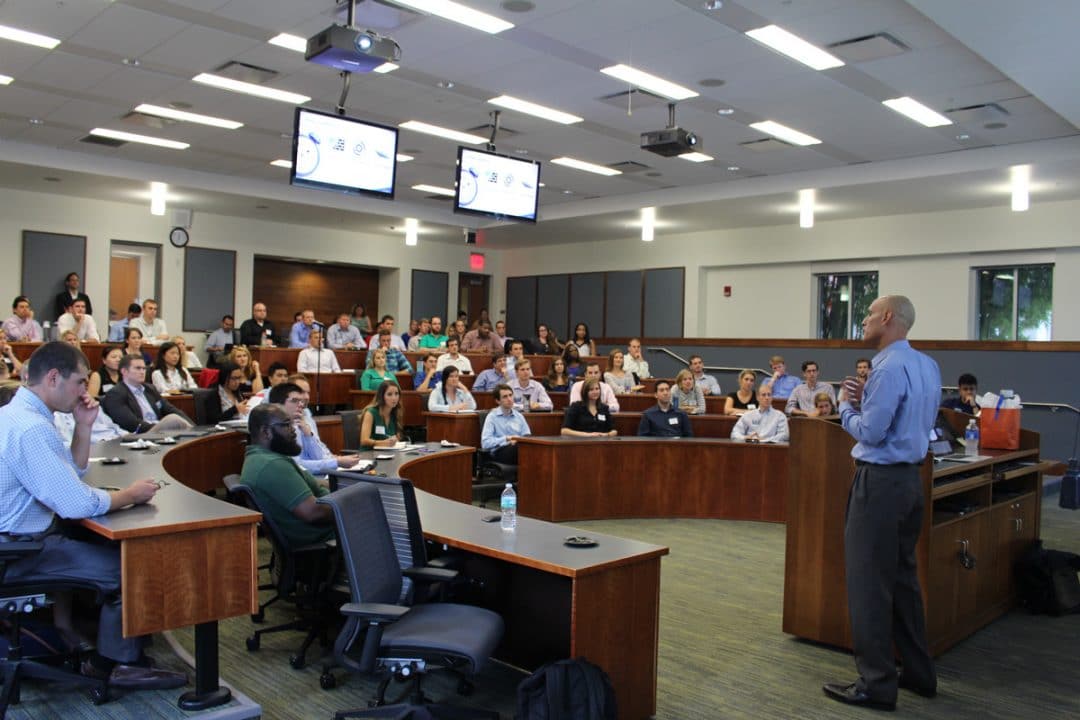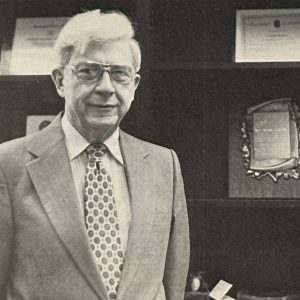COO of Fortune 500 company emphasizes importance of Big Data
By 2020, there will be as many bits of data as there are stars.
By 2020, there will be 50 billion devices connected to the Internet—approximately 6.5 connected devices per person.
Four billion Google searches are being conducted per day.
These were just some of the astonishing statistics and forecasts Bill Muir, the Chief Operating Officer of Jabil, relayed during his appearance to a packed audience of UF MBA students during the program’s Critical Issues in Business series on Wednesday.
If today’s MBA students didn’t already know the unpredictable business environment they will soon enter thanks to the proliferation of data and advances in communications and technology, Muir certainly reinforced it.
“Big data and analytics are some of the most disruptive themes happening in industry today,” Muir said. “We have businesses that have access to data unlike we’ve ever seen in the history of commercial relationships.”
In Muir’s 23 years at Jabil, a Fortune 500, global leader in electronic manufacturing services and solutions, he has witnessed major changes for his company and the electronic manufacturing industry.
What’s significant about those changes now, according to Muir, is how quickly they’re occurring. For example, Muir said as recent as 2 ½ years ago, BlackBerry—then a major player in the mobile phone arena—was one of Jabil’s largest customers.
Now, BlackBerry’s overall market share in smartphones is less than 1 percent, according to a March 2015 report from Gartner.
For every company like BlackBerry that has regressed, there are others that have grown exponentially by leveraging big data. Muir said the abundance and availability of data, along with an insatiable demand for products that enhance connectivity, is creating “hyperscale” businesses that are flourishing.
Muir (BSIE ’92, MBA ’92) also emphasized the buying and media habits of the millennial generation have a significant impact on how Jabil and other tech companies are conducting business. Muir stressed mass customization and the expectation for businesses to provide products and experiences tailor-made for individuals.
“People want the infinite level of customization for how they interact with everything,” Muir said. “The business model of standardization doesn’t work anymore…and that’s creating wholly different business models.”
With more and more companies utilizing big data and analytics, Muir emphasized the need for UF MBA students to have the technical skills to analyze and maximize this information.
“If I were sitting in your shoes, one of the questions I would be asking myself is, ‘How strong is my digital quotient?’” Muir said. “‘How well-equipped am I to be a contributor in a digital economy contingent on the use of data?’”
“I can make a compelling argument that this is without a doubt the most exciting time to come into a commercial environment, an environment that is highly dependent on an intelligent, digital commercial model. The level of disruption, change and innovation you’ll see is unlike anything you’ve seen so far.”




